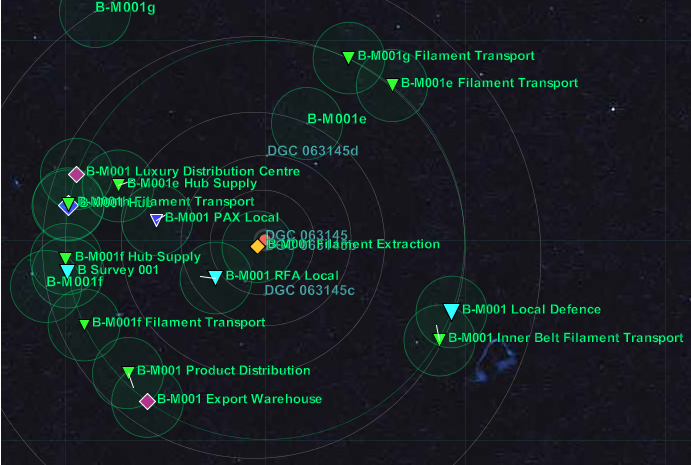
The Game
Diaspora is a space-based single-player strategy game set in the future. The game is intended to be a sandbox and be replayable, with no set goals or ending point. The defining features of the game are as follows.
- Logistics is a fundamental part of Diaspora. Each and every fleet or installation you build will at the very least have a constant need for spare parts to keep everything maintained. A lack of spare parts will lead to decay and eventual destruction.
- An inbuilt configurable multi-agent system based on a simplified version of the Belief-Desire-Intention (BDI) model. Creating and configuring these agents is essential to building a working logistics system without needing excessive micro-management.
Diaspora is developed in Java, and runs as a multi-window game rather than the standard single window/fullscreen almost all games use for presentation. The intention here is to allow players to make best use of multi-monitor systems to be able to manage their civilization more effectively.
The in-game graphics are purely symbolic, intended to mimic what a real-life strategic display might look like. This leaves the player free to mentally picture their ships and installations as whatever they desire rather than be constrained by the game engine. You could be building Vavatch Orbital, the Death Star, Babylon 5, or Deep Space 9.

Initial Context
Your people have had to vacate their origin galaxy via relativistic travel due to existential threats beyond their understanding. Many fleets are sent to different parts of various galaxies with the hope that some will survive and thrive. Your fleet arrives in a cluster of stars in a nearby galaxy with supplies dwindling and will need to immediately set up industry to support themselves. The cluster you find yourself in has been ravaged by millenia-long wars that have led to a stalemate, and leaves the star systems somewhat depleted of resources, having being scoured to feed various war machines over the ages. You begin at a great disadvantage to the indigenous factions that have established themselves across the majority of the cluster, but will be able to find a home for yourself in a neutral zone of stars that separate the previously warring factions. You must be careful not to antagonize the indigenous populations of this cluster in your initially weakened state and would be wise to stick to any limits placed upon you until you have built into a position of strength.
Your civilization has advanced capabilities in what we know of as Artificial Intelligence, although such a term is deeply offensive in the current era. The non-human intelligences within your civilization that control virtually everything are known as Souls. In fact it has been remarked that your society could continue to exist without humans altogether, although the humans do make great contributions to cultural exchanges with other biologically-based lifeforms that may find the Souls difficult to relate to.
The indigenous factions in the existing cluster are not all equal and some have had to abide by onerous restrictions and hardships imposed on them post-conflict which may mean they feel resentful for your presence. You may find yourself having to placate certain factions in the early game by delivering resources those factions are unable to obtain for themselves due to the restrictions; at least until you are in a position to defend yourself.
Relations with indigenous factions can be improved through various means such as providing foreign aid, engaging in commerce of unique luxury goods, general cultural influence, or simply abiding by treaties to keep the peace for some time. Your standing can fall for many reasons, and should your standing fall too far you may find yourself at war.
